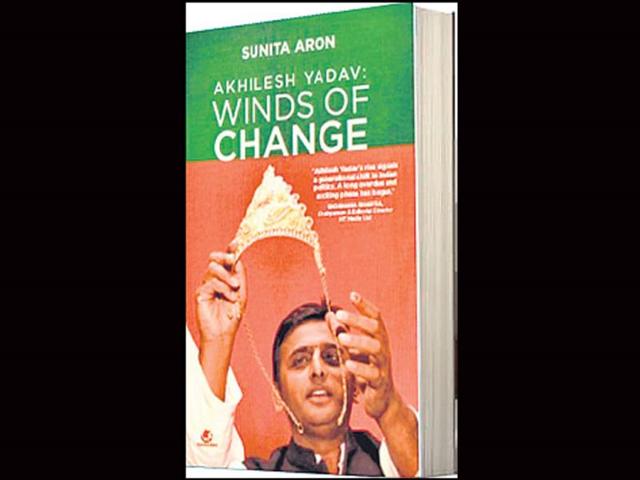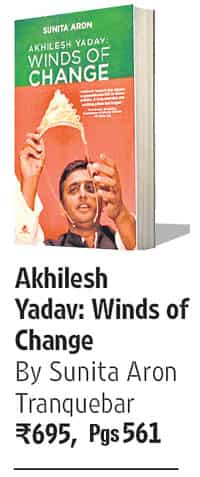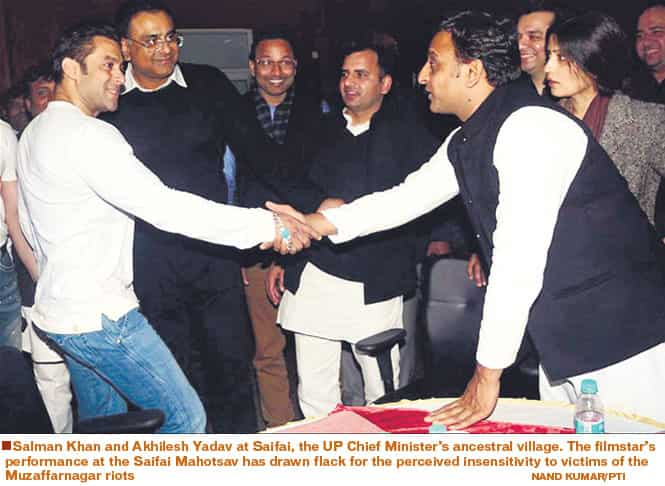Sunita Aron's book 'Akhilesh Yadav: Winds of Change' is a must-read
Aron's book is like a pleasurable bullock-cart journey through cow-belt politics. The volume packs in three parallel plots: a ready reckoner on UP politics, the state satrap Mulayam Singh Yadav's chequered career, and a biography of his son, Tipu or Akhilesh. Vipul Mudgal writes.
Aron's book is like a pleasurable bullock-cart journey through cow-belt politics. The volume packs in three parallel plots: a ready reckoner on UP politics, the state satrap Mulayam Singh Yadav's chequered career, and a biography of his son, Tipu or Akhilesh, the current Chief Minister. The plots unfold in concert but the first two are so theatrical that the title theme almost distracts.

What makes UP so interesting? Is it the state's amoebic alliances, identity politics or its 80 parliamentary seats, more than the combined tally of India's 15 smaller states? No political party can write off or take for granted the land of Rama's Ayodhya, Krishna's Mathura, Shiva's Kashi and the confluence of composite Hindustani culture.
There are things that can happen only in UP. Taking the 'help' of sundry criminals in elections is one thing but the drafting of battalions of India's most wanted dacoits is quite another. The (in)famous gangs include Dadua, Nirbhaya, Phoolan Devi and Chhabi Ram. Until recently, it was business as usual for their ilk to arrange votes, rally crowds and 'manage' booths, as if the cops didn't exist. The UP Police come across as the best private force that money can buy.
It is common knowledge that caste and filial ties between bandits and politicians go back a long way but Aron shows how anti-dacoit operations were once rooted in caste-based retributions. Then there were politicians parading "reformed" dacoits like trophies. The book also shows why the gangs of Wasipur are still trendy in some 500 miles between Etawah and Gorakhpur.
Aron distills the essence of UP through layers of caste, class and denominational politics. It chronicles the escapades of Charan Singh, Chandra Shekhar, VP Singh, Kanshi Ram, Kalyan Singh, Rajnath Singh, Mayawati and Mulayam Singh Yadav, to name only a few. And it is only in comparison that Akhilesh Yadav's antics appear to be a series of fortuitous non-events by UP standards.
The first three on the above list have been PMs in peculiar circumstances and, with the exception of the late Kanshi Ram, the rest are among the hopefuls. Mayawati and Mulayam could be contenders in 2014. Kanshi Ram belonged to UP's super elite a la Jawaharlal Nehru and Ram Manohar Lohia whose ideology transcended their times. Rajnath Singh, who once swung Lucknow's throne, could predictably trump Narendra Modi if the stars are favourable. For the uninitiated, the horoscope can be mightier than the manifesto in UP!
The book brings out some consequential trends. It records the start of 'non-Congressism' through the ascent of the farmer-CM Charan Singh whose protégé Mulayam Singh fought his US-educated son Ajit Singh for the patriarch's legacy. Since blood is thicker than water, the Yadav had to give in to the Jat and raise his own Samajwadi Party (SP). And the rest, as they say, is history, which could be repeating itself today as Mulayam Singh's protégés in SP are fighting a losing battle against his son.
Aron's book chronicles the rise and fall of the SP, the only socialist party in the world which opposes everything sensible from amending Section 377 and Lokpal to passing a women's reservation Bill. Its new boss in UP might be an environmental engineer from Mysore and Sydney but he comes across as clueless about socialism. He is neither pursuing his father's anti-English tirades nor campaigning against computers. In fact, he attracted some serious flak for doling out free laptops when the schools lacked furniture and toilets. All this is interesting but UP's politics is nothing without the 'mandal' and 'kamandal' movements which have dominated India's post-Ayodhya politics. Ayodhya paved the way for NDA's government at the centre. It also conferred the title of 'Maulana Mulayam' on the SP satrap who emerged as the new saviour of the minorities. The post-mandal politics also saw the emergence of the Bahujan Samaj Party (BSP), which is still a force to reckon with. Aron takes you through all this, some startling scams, and much more.

Every student of Indian politics must read this book to grasp the elusive game of numbers called coalitions. UP showed how Mulayam and Mayawati could retain power by calmly dumping the secular for the communal or vice versa. But the worst lesson for all came in 1998 when a blasé Governor Romesh Bhandari made a mockery of competitive democracy by installing Jagadambika Pal, as CM for 48 hours through treachery and partisanship.
(Vipul Mudgal heads the Publics and Policies Programme at the Centre for the Study of Developing Societies (CSDS), Delhi)





